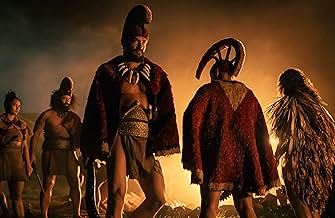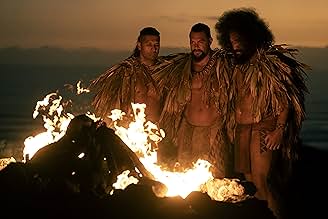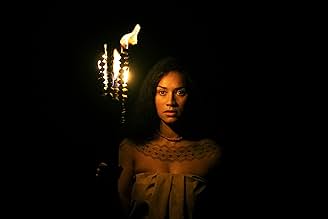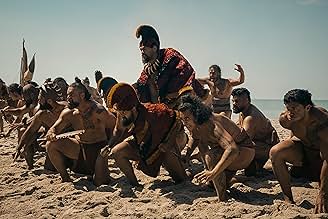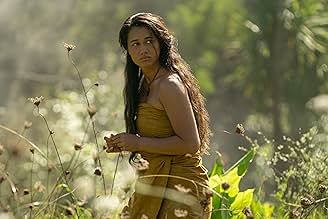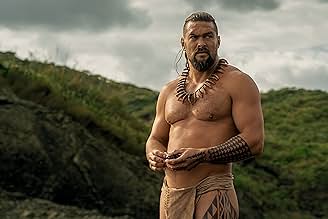A thrilling, unprecedented telling of the unification of the Hawaiian Islands from an indigenous perspective. A Hawaiian war chief joins a bloody campaign to unite the warring islands in ord... Read allA thrilling, unprecedented telling of the unification of the Hawaiian Islands from an indigenous perspective. A Hawaiian war chief joins a bloody campaign to unite the warring islands in order to save them from the threat of colonization.A thrilling, unprecedented telling of the unification of the Hawaiian Islands from an indigenous perspective. A Hawaiian war chief joins a bloody campaign to unite the warring islands in order to save them from the threat of colonization.
Browse episodes
Featured reviews
Wow seriously ignore the dumb negative reviews clearly most of those are folks who did not even watch any of the episodes so far. Check out this new epic story - I'm hooked!
Chief of War is more than just a historical drama-it's a cinematic homage to a culture rarely given this much screen time, and it doesn't waste a single frame in telling its story with reverence, grit, and heart.
Scenery and Cinematography: A Visual Masterpiece
From the opening shots, the Hawaiian islands (and yes I know where it was filmed so what it's beautiful and works setting the right tone) are treated not merely as a backdrop but as a living character. The lush greens, volcanic reds, and expansive blues of the Pacific are captured in breathtaking wide-angle shots and sweeping aerial views. The cinematography is meticulous, almost meditative at times, with deliberate pacing that draws you into the natural rhythm of island life-and the turbulent undercurrents of war.
Whether it's mist-covered cliffs, churning surf, or smoke rising from tribal fires, every scene feels handcrafted. Natural light is used to stunning effect, particularly in golden-hour battles and quiet conversations under torchlight. It's immersive and evocative-clearly influenced by Terrence Malick and The Last of the Mohicans-but with a distinctly Polynesian heartbeat.
Music and Sound Design: A Spiritual Undercurrent - Zimmer sets the mood
The score blends traditional Polynesian instruments with modern cinematic cues to elevate tension and emotion without overpowering the moment. The use of indigenous chants, percussion, and melodic motifs grounds the story in authenticity and identity. Music here doesn't just accompany the narrative-it anchors it. In quieter scenes, the ambient sound of the ocean or jungle builds a visceral sense of place that never lets you forget where you are: this is Hawaii, before the West came calling.
Characterization: Layered, Human, and Authentic
Jason Momoa leads with raw intensity, but it's his restraint in key moments that makes his performance resonate. He embodies a man torn between tradition and transformation-between chief and warrior, between vengeance and vision. The supporting cast is equally strong, particularly the women, who are not sidelined but integral to the emotional and political stakes of the story.
The show avoids turning characters into mere archetypes. Even the antagonists are layered, with motivations rooted in power, fear, or survival, rather than cartoonish villainy. Tribal alliances, family dynamics, and individual ambition collide with believable complexity.
Storytelling: Epic in Scope, Intimate in Heart
At its core, Chief of War tells a story about identity-cultural, personal, and generational. It balances sweeping historical events with intimate personal struggles. The pacing leans slow-burn in the best way, giving characters and conflicts time to breathe.
The writing doesn't spoon-feed exposition, trusting the audience to stay engaged and follow along as customs, rituals, and politics unfold naturally. This lends the show a sense of realism and weight, making the betrayals more heartbreaking and the triumphs more earned.
Themes of legacy, honor, resistance, and sacrifice are woven throughout without becoming didactic. And while the show doesn't shy away from brutality, it also leaves room for beauty, love, and quiet reflection.
Final Verdict:
Chief of War is a powerful, respectful, and beautifully crafted series that elevates indigenous storytelling to a new cinematic high. It's a rare show that educates while it entertains, moves you while it mesmerizes. With its gripping narrative, stunning visuals, rich characters, and soulful score, it's a must-watch for fans of historical epics and cultural storytelling done right.
Chief of War is more than just a historical drama-it's a cinematic homage to a culture rarely given this much screen time, and it doesn't waste a single frame in telling its story with reverence, grit, and heart.
Scenery and Cinematography: A Visual Masterpiece
From the opening shots, the Hawaiian islands (and yes I know where it was filmed so what it's beautiful and works setting the right tone) are treated not merely as a backdrop but as a living character. The lush greens, volcanic reds, and expansive blues of the Pacific are captured in breathtaking wide-angle shots and sweeping aerial views. The cinematography is meticulous, almost meditative at times, with deliberate pacing that draws you into the natural rhythm of island life-and the turbulent undercurrents of war.
Whether it's mist-covered cliffs, churning surf, or smoke rising from tribal fires, every scene feels handcrafted. Natural light is used to stunning effect, particularly in golden-hour battles and quiet conversations under torchlight. It's immersive and evocative-clearly influenced by Terrence Malick and The Last of the Mohicans-but with a distinctly Polynesian heartbeat.
Music and Sound Design: A Spiritual Undercurrent - Zimmer sets the mood
The score blends traditional Polynesian instruments with modern cinematic cues to elevate tension and emotion without overpowering the moment. The use of indigenous chants, percussion, and melodic motifs grounds the story in authenticity and identity. Music here doesn't just accompany the narrative-it anchors it. In quieter scenes, the ambient sound of the ocean or jungle builds a visceral sense of place that never lets you forget where you are: this is Hawaii, before the West came calling.
Characterization: Layered, Human, and Authentic
Jason Momoa leads with raw intensity, but it's his restraint in key moments that makes his performance resonate. He embodies a man torn between tradition and transformation-between chief and warrior, between vengeance and vision. The supporting cast is equally strong, particularly the women, who are not sidelined but integral to the emotional and political stakes of the story.
The show avoids turning characters into mere archetypes. Even the antagonists are layered, with motivations rooted in power, fear, or survival, rather than cartoonish villainy. Tribal alliances, family dynamics, and individual ambition collide with believable complexity.
Storytelling: Epic in Scope, Intimate in Heart
At its core, Chief of War tells a story about identity-cultural, personal, and generational. It balances sweeping historical events with intimate personal struggles. The pacing leans slow-burn in the best way, giving characters and conflicts time to breathe.
The writing doesn't spoon-feed exposition, trusting the audience to stay engaged and follow along as customs, rituals, and politics unfold naturally. This lends the show a sense of realism and weight, making the betrayals more heartbreaking and the triumphs more earned.
Themes of legacy, honor, resistance, and sacrifice are woven throughout without becoming didactic. And while the show doesn't shy away from brutality, it also leaves room for beauty, love, and quiet reflection.
Final Verdict:
Chief of War is a powerful, respectful, and beautifully crafted series that elevates indigenous storytelling to a new cinematic high. It's a rare show that educates while it entertains, moves you while it mesmerizes. With its gripping narrative, stunning visuals, rich characters, and soulful score, it's a must-watch for fans of historical epics and cultural storytelling done right.
...., Hawaiian language and too much dialogue, low functioning humans. I'm 2 episodes in and Momoa is surprisingly good and the other actors are unsurprisingly phenomenal. The flow of the story has been engaging and leaves you wanting to see more and all of this before any fighting scenes. The soundtrack is beautiful, the cinematography is beautiful and whether it's 100% historically correct is irrelevant. Enjoy!
Chief of War is finally here and it has not disappointed. I've been waiting and looking forward to this ever since I first heard about it. Then I saw the trailers and my excitement grew even more. I love these types of shows and movies and I'm a big fan of Jason Momoa. He's had a lot of memorable parts in his career and this is among his best yet. It's such an original story of Hawaiian history that's never been told before. You can tell Momoa but a lot of love into this project. There isn't a dull or boring scene in the entire series. The only bad thing is all the episodes aren't released at the same time because this would be best watched as a binge. Apple TV has hit home run after home run. It reminds me of peak HBO when almost every show they put out is a must watch. I can't recommend this show enough.
Reminds me of the authentic look and feel of the film Apocalypto. Momoa and Morrison are strong anchors with a undeniable on camera presence. Nothing looks or feel fake or weak. Every department that created the series did an amazing job. The language is fascinating and delivered so well by the actors. It's an entertaining thrill and a dynamic history course all in one.
Ignore the half wits that don't do subtitles, it's their loss. As a historical drama it works really well and pays plenty of respect to the indigenous people of the Hawaii's, the language only serves to add the feel of authenticity.
The story is a little clunky at times but it keeps you engaged and the the look of it is luscious. I for one enjoyed it.
The story is a little clunky at times but it keeps you engaged and the the look of it is luscious. I for one enjoyed it.
Did you know
- TriviaJason Momoa did not speak fluent Hawaiian before filming Chief of War. To prepare, he underwent intensive language training with a coach who even lived with him. Momoa called it "the hardest thing I've ever done," admitting it was tougher than learning Dothraki for Game of Thrones. Only about 20% of the cast was fluent at the start, so most, including Momoa, learned from scratch to ensure the series' cultural and linguistic authenticity.
- ConnectionsReferenced in The Nite-Cap: Has The Superhero Hype Come To An End? (2025)
- How many seasons does Chief of War have?Powered by Alexa
Details
- Runtime
- 50m
- Color
- Sound mix
- Aspect ratio
- 2.39:1
Contribute to this page
Suggest an edit or add missing content







